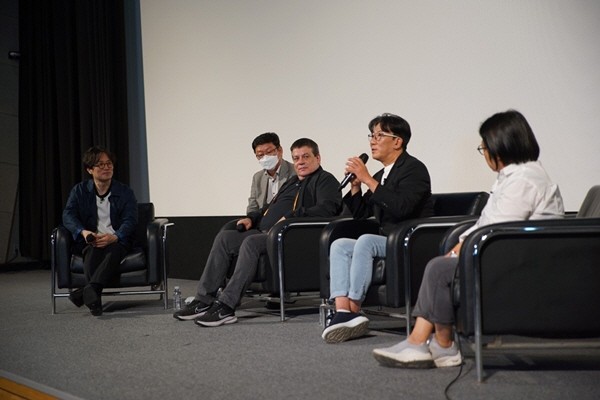130, Suyeonggangbyeon-daero,
Haeundae-gu, Busan, Republic of Korea,
48058
ODE TO MY FATHER
Oct 13, 2020
- Writer by Pierce Conran
- View2507

2014 | 126 MIN | Drama
DIRECTOR JK YOUN
CAST HWANG Jung-min, KIM Yun-jin, OH Dal-su, JUNG Jin-young
RELEASE DATE December 17, 2014
CONTACT CJ Entertainment
Tel +82-2-371-5500
Fax +82-2-371-6340
Email filmsales@cj.net
Director JK YOUN scored one of the biggest hits of all time in 2009 with his big-budget disaster smash Haeundae, which was largely responsible for kicking off the disaster film trend in Korea but was also one of the most ambitious technical achievements in Korea at the time. Over the next few years, YOUN built a slate of big-budget action-oriented films through his production company JK Film. However, these pricey films, which included Sector 7 (2011), Quick (2011) and The Spy: Undercover Operation (2013), mostly underperformed at the box office. For his own return to the director’s chair five years after Haeundae (2009), YOUN took on the most ambitions (and expensive) project of his career, but rather than focus on genre spectacle, he doubled down on the part of his formula that he’s clearly the most at ease with, and which really seals the deal for local audiences - melodrama.
Duk-su (HWANG Jung-min) is an old man who runs a small store in Busan’s vibrant International Market (Guk-je-si-jang - the Korean title of the film). He struggles with his family who want him to sell the store, but he has trouble letting go. His memories drift back to his past, when as a young boy he and his family tried to escape their home town during the Korean War. They board a boat during the Hungnam Evacuation, but Duk-su loses his younger sister Mak-soon and his father (JUNG Jin-young) goes after her, separating the family.
What remained of the family make their way to Busan and Duk-su’s aunt’s store in the International Market. Duk-su grows up and works himself to the bone trying to help his brother pay for college tuition but it’s not enough so he and his friend Dal-gu (OH Dal-su) leave for Germany as miners. The work is hard, but Duk-su meets the Korean nurse Young-ja (KIM Yun-jin) there. Following a bad accident, Duk-su returns to Korea and marries Young-ja. Money becomes scarce again after his aunt passes away but he refuses to let her husband sell her store and so he buys it himself, but the only way her can afford it is to travel to wartorn Vietnam. Duk-su returns and continues to run the store. Later, in 1983, the Korean Broadcasting Station launches a series of programs to reunite families torn apart by the Korean War. Duk-su heads to Seoul, hoping to track down his lost father and sister.
Ode to My Father (2014), which cost a considerable KRW 14 billion (USD 13 million) to produce and involved shooting in YOUN’s Busan hometown as well as Thailand and the Czech Republic - doubling for Vietnam and Germany, respectively - threads together four major events from Korea’s past, each with a connection to overseas nations, from the 1950s, 60s, 70s and 80s, all through the story of one man whose sole goal is to keep his family together.
Disaster strikes deep down in a German mine, explosions and skirmishes erupt in the Vietnam jungle and massive crowds assemble time and again, but Ode to My Father (2014) is not your usual blockbuster. YOUN took the salient points of Korea’s melodramatic tradition on the screen and super-sized them, in effect pioneering a uniquely Korean blockbuster melodrama style. Part of this effect is realized through the melodic and aching symphonies from LEE Byung-woo, the composer of The Host (2006) who hasn’t scored a film since YOUN’s work, and arresting period sets from famed production designed RYU Seong-hee (The Handmaiden, 2016). Leading the cast is the gregarious everyman HWANG Jung-min, operating then at the peak of his box office powers as he kicked off a run that would also include Veteran and The Himalayas (another JK Film production) in 2015 and A Violent Prosecutor and THE WAILING in 2016.
This distinctly Korean melodrama epic was a storming success with viewers, particularly older crowds who were swept up by the film’s nostalgic elements - most notably the emotional and sensation KBS family reunion broadcasts that gripped the nation in the early 1980s. The film became the second most successful Korean film of all time at the time of its release (it has since slipped to fourth).
























